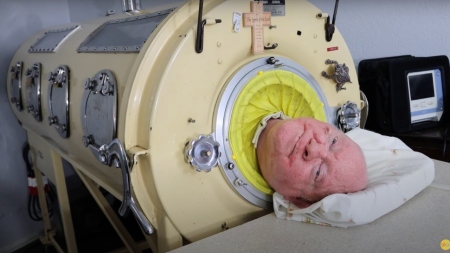Paul Alexander, confined 72 years in iron lung, spoke of 'God's love' before death

A man who set the Guinness World Record for living the longest time in an iron lung spoke about the love of God his family showed him before his death on Monday at 78.
For more than 70 years, Paul Alexander had been confined to the large cylindrical mechanical ventilator that used air pressure to help him breathe since polio paralyzed his chest muscles in 1952 at age 6, three years before the rollout of the polio vaccine.
Within days of first feeling ill one summer day, Alexander had lost most of his motor functions and ultimately became paralyzed from the neck down. He spent 18 months in the hospital, where he was unable to communicate with his parents because of a tracheotomy — though he noted in interviews that they visited him daily and eventually took him home on Christmas Eve 1953.
Though his doctors did not expect him to survive, and many of the other polio-stricken children in the iron lungs at the hospital died, Alexander chose not to let his disability defeat him.
He learned how to write and paint with his mouth using a long plastic stick and spent years learning how to spend time outside the iron lung by gulping down enough air — a technique known as "glossopharyngeal breathing."
When he was 8, his therapist from the March of Dimes promised him a puppy if he could learn how to use the technique to remain outside the iron lung for three minutes, which influenced the title of his 2020 self-published autobiography, Three Minutes for a Dog: My Life in an Iron Lung. The book took him eight years to type out or dictate.
He eventually was able to spend portions of the day outside the iron lung with the help of a modified wheelchair that kept his body upright.
With the aid of a tutor, Alexander graduated second in his class at W.W. Samuell Alexander High School in 1967 at age 21.
After two years of fighting assertions from admissions officials that he was too crippled to attend, he also went to college, first at Southern Methodist University in Dallas and then at the University of Texas at Austin, where he received his bachelor’s degree in 1978 and a law degree in 1984.
After passing the bar exam in 1986, he specialized in family law and bankruptcy as an attorney in Dallas and Fort Worth. He fell in love with a woman named Claire, and the two were engaged until her mother demanded the two break it off and never speak to each other again.
Alexander's family was religious and attended a Pentecostal church in Dallas, where his father would go to the front of the church to pray, according to a profile in The Guardian. Alexander's brother, Philip, noted to the outlet that their father would sometimes take him up there with him and grow overwhelmed with emotion during such moments.
"He’d just cry and cry," he remembered.
During an interview with his friend Christopher Ulster in 2022, Alexander detailed the hellish experience of becoming paralyzed at such a young age, but noted how deeply his parents loved him amid his suffering, which he said reminded him of God's love.
"I had a whole life lived with them, and it was amazing," he said of his late parents, whose portraits he kept next to him. "You know, they talk about God's love. That's just words. But when you actually receive it, boy, it's something."
"I don't believe anybody could be like that," he added. "I cannot believe that people exist of their quality. They loved me so much. They loved their kids."
Alexander also explained the importance of finding purpose regardless of one's limitations.
"I look at people and I just want to say, 'Why are you here? What is the purpose? There's a purpose in your life. What do you do to make things better?' Because that's the way I think," he said.
"If I don't have a purpose today, I'll create one," he added.
After meeting him in 2022, Ulster helped offset Alexander's considerable medical expenses by raising more than $143,000 in a GoFundMe campaign, which will now be used to pay for his funeral.
"It allowed him to live his last few years stress-free," Alexander's brother, Philip, said in a statement posted to GoFundMe on Tuesday. "It will also pay for his funeral during this difficult time. It is absolutely incredible to read all the comments and know that so many people were inspired by Paul. I am just so grateful."
Jon Brown is a reporter for The Christian Post. Send news tips to jon.brown@christianpost.com





















